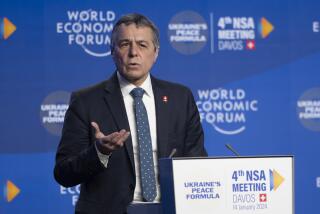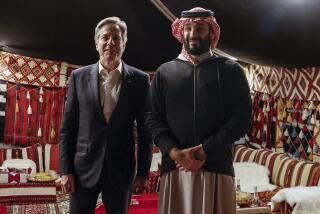Multilateral Group Vows to Revive Mideast Peace Effort
- Share via
MOSCOW — Foreign ministers from Israel, several Arab countries and elsewhere pledged here Tuesday to revive a long-neglected component of the Middle East peace process amid hopes that it can assist in the tortuous search for final agreements in the region.
Meeting for the first time in eight years at such a high level, ministers representing the steering committee of the Multilateral Middle East Conference agreed to set up a permanent secretariat to explore economic development prospects for the region as a whole. They also decided to reactivate dormant working groups to address some of the most sensitive and difficult issues in the Mideast, including refugees, water and the environment.
But according to those who attended the daylong session, co-chaired by U.S. Secretary of State Madeleine Albright and Russian Foreign Minister Igor S. Ivanov, the most significant part of the meeting may have been the participants’ unexpected receptiveness to greater cooperation.
U.S. officials attributed much of the upbeat mood to creative Russian hosts who set a relaxed tone. The Russian hospitality began with a dinner Monday evening complete with a greeting by dancers and folk singers and a shot of vodka for each guest. Ivanov and Albright were driven around in a sleigh on the Moscow snow and, before the ride was over, had switched hats--she donning his winter fur hat and he her Stetson.
Diplomats said the unusual informality at a dinner that brought together Israelis, Arabs, Americans, Russians, Chinese, Japanese and others extended into Tuesday’s session, carrying with it a greater willingness to cooperate.
The multilateral process, started in 1991, was co-sponsored by Washington and Moscow as a parallel track to bilateral negotiations. Its aim was to study economic and social issues in order to better prepare the entire Mideast for life after peace was achieved. While Israel, Egypt, Jordan and the Palestinians joined along with more than 30 other nations, Syria and Lebanon refused to take part.
After a series of initial meetings, the process gradually lost momentum, and as Israeli-Palestinian talks stalled in the mid-1990s, work all but stopped.
Tuesday, however, delegates concluded their meeting with both an agreement to revive the process and a sense that the positive spirit in Moscow might spill over into the Israeli-Palestinian talks, currently in a critical phase, as well as Israel’s stalled peace negotiations with Syria.
“I hope that it will prove to be a milestone on the path to a fruitful and lasting peace for all the people of the Middle East,” Albright told reporters at a news conference after the meeting. “ . . . The issues that need to be discussed have been relaunched.”
More to Read
Sign up for Essential California
The most important California stories and recommendations in your inbox every morning.
You may occasionally receive promotional content from the Los Angeles Times.













